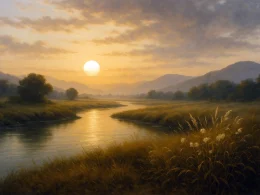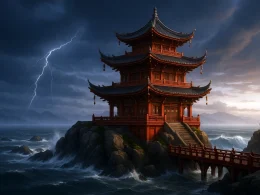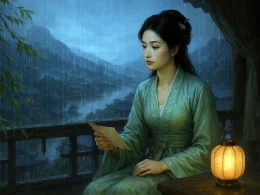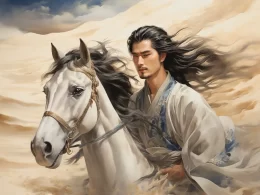The foe shoot arrows on frontier in autumn day;
The startled grieved wild geese disperse and fly away.
The statue sees their shadows pass beneath the moon bright;
The lonely palace hears their cries in candlelight.
You know the foe would run their horses therefore long.
Could you go back one and all when spring sings its song?
Don't say few live on Southern rivers up and down!
With water plants the Southern shores are overgrown.
Original Poem
「早雁」
杜牧
金河秋半虏弦开,云外惊飞四散哀。
仙掌月明孤影过,长门灯暗数声来。
须知胡骑纷纷在,岂逐春风一一回。
莫厌潇湘少人处,水多菰米岸莓苔。
Interpretation
"To the Early Wild Geese" was written around 850 AD during the reign of Emperor Xuanzong of the Tang Dynasty. At the time, the northern borders were plagued by frequent invasions from the Uyghurs, and although the Tang court issued decrees to conscript soldiers, it was unable to effectively quell the unrest. This led to widespread displacement and suffering among the people. Witnessing this turmoil, Du Mu was moved to compose this poem, using the image of startled geese to express his feelings.
First Couplet: "金河秋半虏弦开,云外惊飞四散哀。"
Jīn hé qiū bàn lǔ xián kāi, yún wài jīng fēi sì sàn āi.
In mid-autumn by the Golden River, the invaders draw their bows; startled geese scatter in the clouds, their cries filled with sorrow.
These lines depict the chaos and suffering caused by the invasions. The geese, startled by the invaders' arrows, scatter in fear, their cries echoing the distress of the displaced people. This imagery serves as a metaphor for the widespread suffering brought about by the war, conveying Du Mu's deep sympathy for those affected.
Second Couplet: "仙掌月明孤影过,长门灯暗数声来。"
Xiān zhǎng yuè míng gū yǐng guò, Chángmén dēng àn shù shēng lái.
Under the bright moon, a lone shadow passes the Immortal's Palm; from the dim lights of Changmen Palace, a few mournful cries are heard.
Here, Du Mu uses the imagery of a lone goose passing under the moon and the faint lights of Changmen Palace to create a somber and desolate atmosphere. The "lone shadow" (孤影过) symbolizes the isolation and helplessness of the displaced people, while the "dim lights" (灯暗) suggest the indifference of the court to their plight.
Third Couplet: "须知胡骑纷纷在,岂逐春风一一回?"
Xū zhī hú qí fēn fēn zài, qǐ zhú chūnfēng yī yī huí?
Know that the barbarian cavalry still roam; how can the geese return with the spring breeze?
In this couplet, Du Mu shifts from the present to the future, expressing his concern that the displaced people will not be able to return home as long as the invaders remain. The rhetorical question underscores the hopelessness of their situation and the poet's deep concern for their fate.
Fourth Couplet: "莫厌潇湘少人处,水多菰米岸莓苔。"
Mò yàn Xiāoxiāng shǎo rén chù, shuǐ duō gū mǐ àn méi tái.
Do not disdain the desolate lands of Xiaoxiang; by the waters, there is wild rice and moss on the banks.
In the final couplet, Du Mu offers a word of comfort to the displaced. He advises them not to despise the remote and sparsely populated Xiaoxiang region, where they can find sustenance in the wild rice and moss. This shift from lament to consolation reflects Du Mu's compassion and his hope that the displaced can find temporary refuge and solace.
Overall Appreciation
This poem uses the image of startled geese to symbolize the suffering of the displaced people during a time of war.
The first couplet vividly portrays the chaos and fear caused by the invaders, with the scattering geese serving as a metaphor for the displaced population. The second couplet deepens the sense of isolation and helplessness, using the imagery of a lone goose and the dim lights of the palace to evoke a somber mood.
The third couplet shifts to a more reflective tone, expressing concern for the future and the hopelessness of the displaced people's situation. The final couplet offers a word of comfort, suggesting that even in desolate lands, there is sustenance and hope.
The poem's strength lies in its ability to blend vivid imagery with deep emotional resonance. Du Mu's use of symbolism and his subtle portrayal of the displaced people's plight make this poem a powerful meditation on the human cost of war and the importance of compassion.
Writing Characteristics
- Symbolism and Imagery
The poem uses the image of startled geese to symbolize the suffering of the displaced people, creating a powerful and evocative metaphor. - Atmosphere and Mood
The somber and desolate atmosphere of the poem mirrors the plight of the displaced, creating a strong emotional impact. - Shift from Lament to Consolation
The poem begins with a lament for the suffering caused by war but ends with a word of comfort, reflecting Du Mu's compassion and hope.
Insights
This poem offers a poignant reflection on the human cost of war and the importance of compassion. Du Mu's portrayal of the displaced people's suffering resonates deeply, reminding us of the need to care for those who are most vulnerable in times of crisis.
The poem also highlights the importance of hope and resilience. Even in the face of despair, Du Mu offers a word of comfort, suggesting that even in the most desolate places, there is sustenance and the possibility of finding solace.
Ultimately, "The Startled Geese" is a meditation on the impact of war, the resilience of the human spirit, and the importance of compassion and hope. It challenges us to reflect on our own lives and to seek out ways to support and uplift those who are suffering.
Poem translator
Xu Yuan-chong (许渊冲)
About the poet
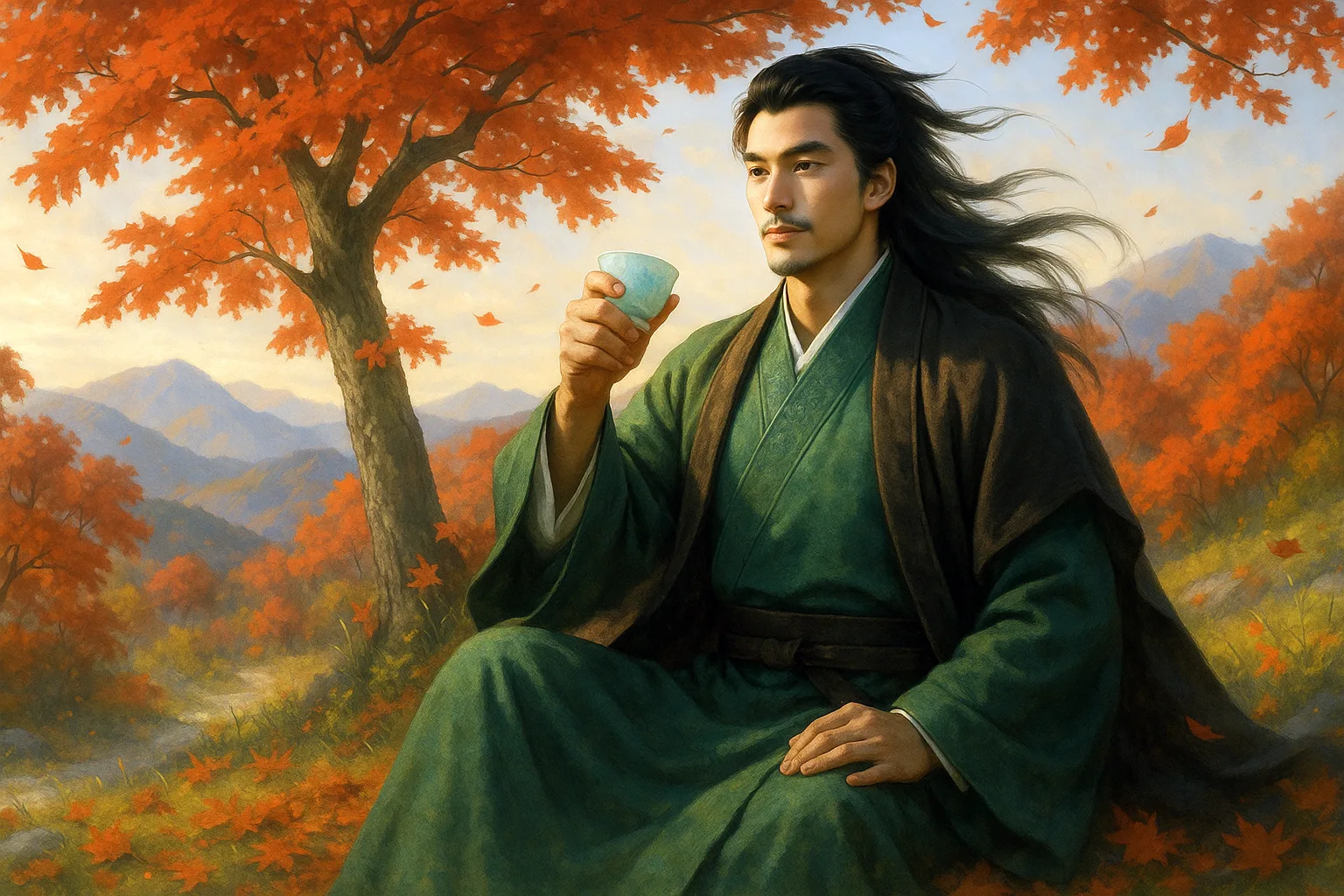
Du Mu (杜牧), 803 - 853 AD, was a native of Xi'an, Shaanxi Province. Among the poets of the Late Tang Dynasty, he was one of those who had his own characteristics, and later people called Li Shangyin and Du Mu as "Little Li and Du". His poems are bright and colorful.









